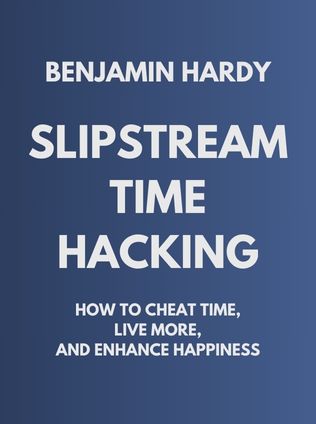
Slipstream Time Hacking
How to Cheat Time, Live More, And Enhance Happiness
By Benjamin Hardy
Published 12/2015
About the Author
Benjamin Hardy is an organizational psychologist, an influential blogger, and a prolific author whose works delve into the intricacies of self-improvement and personal development. Hardy’s insights are grounded in both academic research and personal experience, making his work not only intellectually stimulating but also deeply practical. His journey into the realm of psychology and self-improvement was not linear, but rather a quest fueled by his desire to make the most out of the limited time we have in life. Hardy’s other notable works include Willpower Doesn’t Work (2018), Personality Isn’t Permanent (2020), Be Your Future Self Now (2022), and The Gap and The Gain (2020), co-authored with Dan Sullivan.
In 2015, Hardy wrote Slipstream Time Hacking, a book that he funded through a Kickstarter campaign while he was still a Ph.D. student. This book, like much of his work, challenges conventional wisdom about time management and productivity, urging readers to rethink how they perceive and use time. Hardy’s approach is both radical and refreshing, encouraging individuals to break free from the traditional constraints of time and embrace a more fluid, dynamic understanding of how we can live our lives.
Main Idea
At the heart of Slipstream Time Hacking is a powerful idea: that we can fundamentally change our experience of time by altering our approach to it. Hardy argues that time is not a fixed, linear resource, but rather something that can be bent, stretched, and manipulated to suit our needs and goals. The book introduces the concept of "slipstream time hacking," a method that allows us to accelerate our progress toward our most important goals, effectively slowing down our perception of time in the process.
Hardy’s central thesis is that by focusing on the quality of our time rather than the quantity, and by aligning our actions with our deepest values, we can create a life that is not only more productive but also more meaningful. He uses principles from physics—such as relativity, time dilation, slipstreams, and wormholes—as metaphors to explain how we can achieve this transformation. These concepts are not just theoretical; Hardy provides practical steps and examples to show how anyone can apply them to their own life.
Table of Contents
- Introduction to Slipstream Time Hacking
- Understanding the Relativity of Time
- Harnessing Time Dilation
- Leveraging the Power of Slipstreams
- Finding Wormholes to Accelerate Progress
- Practical Steps to Apply Slipstream Time Hacking
- Living a Meaningful Life
- Conclusion: The Future of Time Hacking
Introduction to Slipstream Time Hacking
In the introduction, Hardy sets the stage by discussing the universal challenge of time management. He notes that many people feel constantly pressed for time, racing against deadlines, and struggling to balance work, family, and personal goals. This pervasive sense of time scarcity often leads to stress, burnout, and a feeling that life is slipping away without achieving what truly matters.
Hardy introduces the concept of "slipstream time hacking" as a revolutionary way to approach time. Drawing an analogy to the concept of a slipstream in physics—a region of reduced pressure behind a moving object, which allows following objects to move faster with less energy—he suggests that we can find ways to move through life more efficiently, achieving our goals in less time and with less effort. This concept is not just about working harder or faster, but about working smarter, aligning our efforts with the natural flow of time and the opportunities around us.
Understanding the Relativity of Time
One of the foundational concepts in Slipstream Time Hacking is the idea that time is relative. Hardy draws on Albert Einstein’s theory of relativity to explain how our perception of time can change depending on our frame of reference. Just as time slows down for an astronaut traveling at the speed of light, Hardy argues that we can alter our perception of time by changing the speed at which we move toward our goals.
This concept is crucial because it challenges the traditional view that time is a fixed, linear resource. Instead, Hardy encourages readers to think of time as a flexible dimension that can be manipulated. By accelerating our progress toward meaningful goals, we can make time "slow down," allowing us to achieve more and live more fully in the time we have.
Sign up for FREE and get access to 1,400+ books summaries.
You May Also Like
The Subtle Art of Not Giving a F*ck
A Counterintuitive Approach to Living a Good Life
By Mark MansonRich Dad Poor Dad
What the Rich Teach Their Kids About Money - That the Poor and Middle Class Do Not!
By Robert T. KiyosakiHow To Win Friends and Influence People
The All-Time Classic Manual Of People Skills
By Dale CarnegieQuiet: The Power of Introverts
The Power of Introverts in a World That Can't Stop Talking
By Susan Cain



















